10 People Foods to Never Feed Your Dog
by www.SixWise.com
Like humans, pets of all kinds need a varied diet -- with fresh foods added -- to function at their best.
So feeding your pet "people food" like high-quality raw meats and veggies, supplemented with essential vitamins and minerals, can actually be very healthy for dogs and cats, provided the diet is properly balanced and varied.
That said, there are some people foods that do not agree with cats and dogs, and in fact can be downright harmful. Of course, as with people, if you feed your dog junk food like white bread, gummy bears and potato chips they most likely will not thrive. But there are some people foods you might think are healthy that are deceptively dangerous for your furry family members.
With that in mind, the American Society for the Prevention of Cruelty to Animals has detailed the top 10 people foods that you should never give to your dog -- even though they’re fine for you.
10 Foods to Never Feed Your Dog
1. Avocados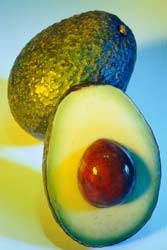
Avocados are great for you, but their leaves, fruit, seeds and bark contain a substance known as Persin, which can cause vomiting and diarrhea in dogs. Avocados are also dangerous for birds and rodents, which can have difficulty breathing and fluid accumulation around the heart upon ingestion.
2. Grapes & Raisins
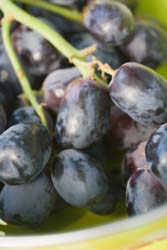 These seemingly innocent fruits can cause kidney failure in dogs, especially in pets that already have health problems. Researchers are still not sure why grapes and raisins are toxic to dogs, but keep them off-limits to Fido anyway.
These seemingly innocent fruits can cause kidney failure in dogs, especially in pets that already have health problems. Researchers are still not sure why grapes and raisins are toxic to dogs, but keep them off-limits to Fido anyway.
|
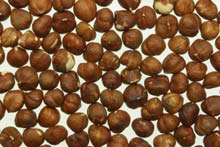 3. Macadamia Nuts 3. Macadamia Nuts
These delicacies for you can cause weakness, depression, vomiting, tremors and hyperthermia in dogs, usually within 12 hours of digestion. Macadamia nuts are often found in cookies and candy, so double check the ingredients list for macademias before you give your dog any nut-containing item.
|
|
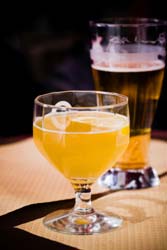 4. Alcohol 4. Alcohol
A bit obvious, but alcoholic beverages or foods containing alcohol (rum cake!) should not be shared with your furry family members. In dogs, alcohol can cause vomiting, diarrhea, decreased coordination, central nervous system depression, difficulty breathing, tremors, abnormal blood acidity, coma and death.
|

5. Yeast Dough
If you’re making homemade bread or cinnamon rolls, make sure the uncooked dough is stored safely out of your dog’s reach while it rises. The rising yeast can cause gas in your pet’s digestive system than can even cause the stomach or intestines to rupture. Once the dough is baked, the risk diminishes.
|
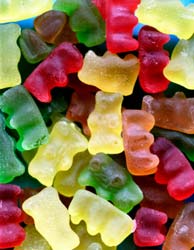
6. Xylitol
Xylitol is an artificial sweetener found in many sugar-free candies, gums and baked goods, as well as in toothpaste. It can cause low blood sugar levels and liver failure in dogs, so it’s important to keep anything sweetened with xylitol well out of your pup’s reach. Signs of poisoning can include vomiting, lethargy, loss of coordination, recumbancy and seizures.
|
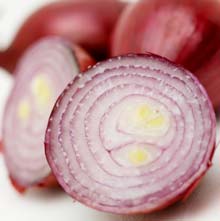
7. Onions, Chives
Large amounts of onions, chives and other veggies in this family can cause gastrointestinal irritation and red blood cell damage in dogs and, especially, in cats. Although occasional small amounts will likely not cause a problem, be very careful to avoid large or recurrent doses.
|
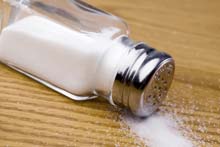
8. Salt
Too much salt can lead to excessive thirst and urination, sodium poisoning, vomiting, diarrhea, depression, tremors, elevated body temperature, seizures and even death in pets. So avoid giving any foods that are overly salty to your pets.
|
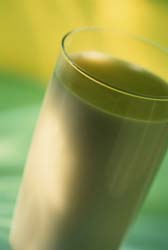
9. Milk
Milk and milk-based foods can cause diarrhea or digestive upset in pets because they lack significant amounts f lactase, the enzyme needed to break down lactose in milk.
|
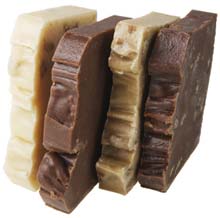
10. Chocolate, Caffeine and Coffee
These products contain methylxanthines, which can cause vomiting and diarrhea, panting, excessive thirst and urination, hyperactivity, abnormal heart rhythm, tremors, seizures and even death in pets. Dark chocolate contains more methylxanthines than milk or white chocolate, so be especially careful to keep dark or baking chocolate away from your pets at all times.
|
What SHOULD You Feed Your Dog and Cat?
Giving your pet high-quality, species-appropriate food is absolutely essential to keeping him healthy -- and a healthy pet needs fewer visits to the vet, saving you money, too.
However, many commercial pet foods are heavy in refined carbohydrates. Neither dogs nor cats are designed to process this overload of excess grains. Further, a high-grain diet can lead to the over-production of insulin in your pet, which in turn can make it difficult for your pet to maintain the proper weight, and may lead to diabetes, osteoarthritis, cancer, heart disease and other health problems.
Instead, one of the best ways to feed your dog is using a species-appropriate diet, similar to the one they would find in the wild.
Fortunately, there are numerous high-quality brands of top-notch dog foods on the market that make this easy, and SixWise.com highly recommends viewing the select line of dog foods carried by GreenerWiener.com.
If you like the idea of feeding a raw diet, but aren’t sure how to jump in, an excellent starting point is Sojos Grain-Free Dog Food Mix.
This grain-free alternative to kibble is a wholesome pre-mix that you combine with raw meat and water to create a fresh, homemade dog food -- it's optimal nutrition for your dog with minimal effort on your part.
And you can be sure your dog is getting wholesome nutrition when you choose Sojos, as it's made with simple, honest ingredients like dried sweet potatoes, whole eggs and apples -- and absolutely no preservatives and nothing artificial. (If you have cats, Sojos also makes a European-Style Cat Food Mix that allows you to feed your cat the nutritious raw food he craves in just minutes a day).
Further, the Honest Kitchen line from GreenerWiener.com makes all of their pet food recipes in a human-food plant to ensure the highest possible quality control and production standards. Their facility is FDA inspected -- and humans actually taste their foods as part of their Quality Control process!
Depending on your pet’s needs, you can try any of these healthy options:
These foods truly make it simple to give your dog (and cat) the food he’s meant to eat.
Be sure to choose healthy treats, too. Here, some people foods can make great options. Veggies like baby carrots, broccoli, celery, berries and asparagus make great low-cal treats for dogs. Sardines and dehydrated pure meat treats (cats also love these) are also great options.
To satisfy your pup’s need to chew, there are healthy options for this too.
-
Elk Antler Chews from GreenerWiener.com: Elk Antler Chews are the longest lasting chews available on the market. Made from naturally shed antlers that won't splinter like other hard chews, they're great for promoting healthy teeth and gums. They're also a 100% natural source of over 40 essential nutrients promoting strong bones and healthy joints.
What you’ll notice is that the above foods and treats are natural, whole foods that are appropriate for your canine or feline family member. Remember that while certain people foods like the ones listed above should be avoided, fresh, high-quality, human-grade foods will help your pet to thrive.

SixWise Says ...
“Near this spot are deposited the remains of one who possessed beauty without vanity, strength without insolence, courage without ferocity, and all the virtues of Man, without his vices.”
--Lord Byron, epitaph on his Newfoundland dog
Recommended Reading
Is Rawhide Safe for Dogs? A Hidden Risk Every Pet Owner Should Know
How to Save Money on Vet Care: 5 Key Tips
Sources
American Society for the Prevention of Cruelty to Animals: People Foods to Avoid Feeding Your Pets